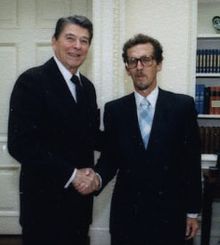James Bishop (diplomat)
James Bishop | |
|---|---|
 right, 1987 | |
| Born | July 21, 1938 |
| Nationality | American |
| Occupation | Diplomat |
| Years active | 1960-1993[1]:4, 117 |
| Known for | U.S. Ambassador to Niger (1979-81), Liberia (1987-90), and Somalia (1990-91) |
James Keough Bishop Jr. (born July 21, 1938) is an American Foreign Service Officer, who served as U.S. Ambassador to Niger (1979–81), Liberia (1987-90), and Somalia (1990–91).
Bishop's last ambassadorial posting to Somalia ended in a rescue by the U.S. military in Operation Eastern Exit, when the embassy came under threat as a result of military action in the Somali Civil War.
Biography[]
Early life and education[]
Bishop was born July 21, 1938 in New Rochelle, New York[2] to James Keough Bishop Sr. and Dorothy (née O'Keefe).[3] He graduated from the College of the Holy Cross (B.S., 1960) and Johns Hopkins University's School of Advanced International Studies (M.I.I.P., 1981).[2][4]
Diplomatic career[]
After graduating from college in 1960, Bishop entered the Foreign Service in 1960, where he held the following diplomatic positions:
- press officer at the Department of State, 1961–63
- vice consul in Auckland, New Zealand, 1963–66
- consul in Beirut, Lebanon, 1966
- economic officer in Beirut, Lebanon, 1966–68
- economic officer in Yaoundé, Cameroon, 1968–70
- desk officer for Chad, Gabon, Mauritius and Madagascar, 1970–72
- desk officer for Ghana and Togo, 1972–74
- Deputy Director for West Africa at the Department of State, 1974–76
- Director of North African Affairs at the Bureau of Near Eastern and South Asian Affairs at the Department of State, 1977–79
- Ambassador to the Republic of Niger, 1979–81
- Deputy Assistant Secretary for African Affairs at the Department of State, 1981–87
- Ambassador to the Republic of Liberia, 1987-90[4]
- Ambassador to the Somali Democratic Republic, 1990-91[5]
- Principal Deputy Assistant Secretary of State for Human Rights and Humanitarian Affairs, 1991-93[1][6]
Bishop retired from the Foreign Service in 1993.[1]
Personal life[]
Bishop and his wife mechanical engineer Kathleen Marie Kirby (February 14, 1947 – September 29, 2011)[7] have six children and were married from 1977 until Kathleen death.[3][4] Bishop and his first wife, attorney Ann Richardson Heilemann (December 15, 1940 – April 17, 2012), were married from 1970 to 1976 and have three children and two grandchildren.[8] He is Roman Catholic.[1]
References[]
- ^ Jump up to: a b c d Kennedy, Charles (1998). "Ambassador James K. Bishop, Jr" (PDF). The Association for Diplomatic Studies and Training. Retrieved 5 January 2016.
- ^ Jump up to: a b Reagan, Ronald. "Nomination of James Keough Bishop To Be United States Ambassador to Liberia". Ronald Reagan Presidential Museum & Library.
- ^ Jump up to: a b James Keough Bishop, Obituary, New York Times, April 9, 2006
- ^ Jump up to: a b c Nomination of James Keough Bishop To Be United States Ambassador to Somalia, April 19, 1990, White House press release
- ^ James Keough Bishop (1938–), U.S. Dept. of State
- ^ U.S. MEMO REVEALS DISPUTE ON BOSNIA, New York Times, June 25, 1993
- ^ "Kathleen K. Bishop". Washington Post. October 14, 2011. Retrieved 5 January 2016.
- ^ https://www.legacy.com/obituaries/washingtonpost/obituary.aspx?n=ann-b-richardson&pid=157109524
- 1938 births
- Ambassadors of the United States to Liberia
- Ambassadors of the United States to Niger
- Ambassadors of the United States to Somalia
- College of the Holy Cross alumni
- Paul H. Nitze School of Advanced International Studies alumni
- Living people
- People from New Rochelle, New York
- United States Foreign Service personnel
- 20th-century American diplomats